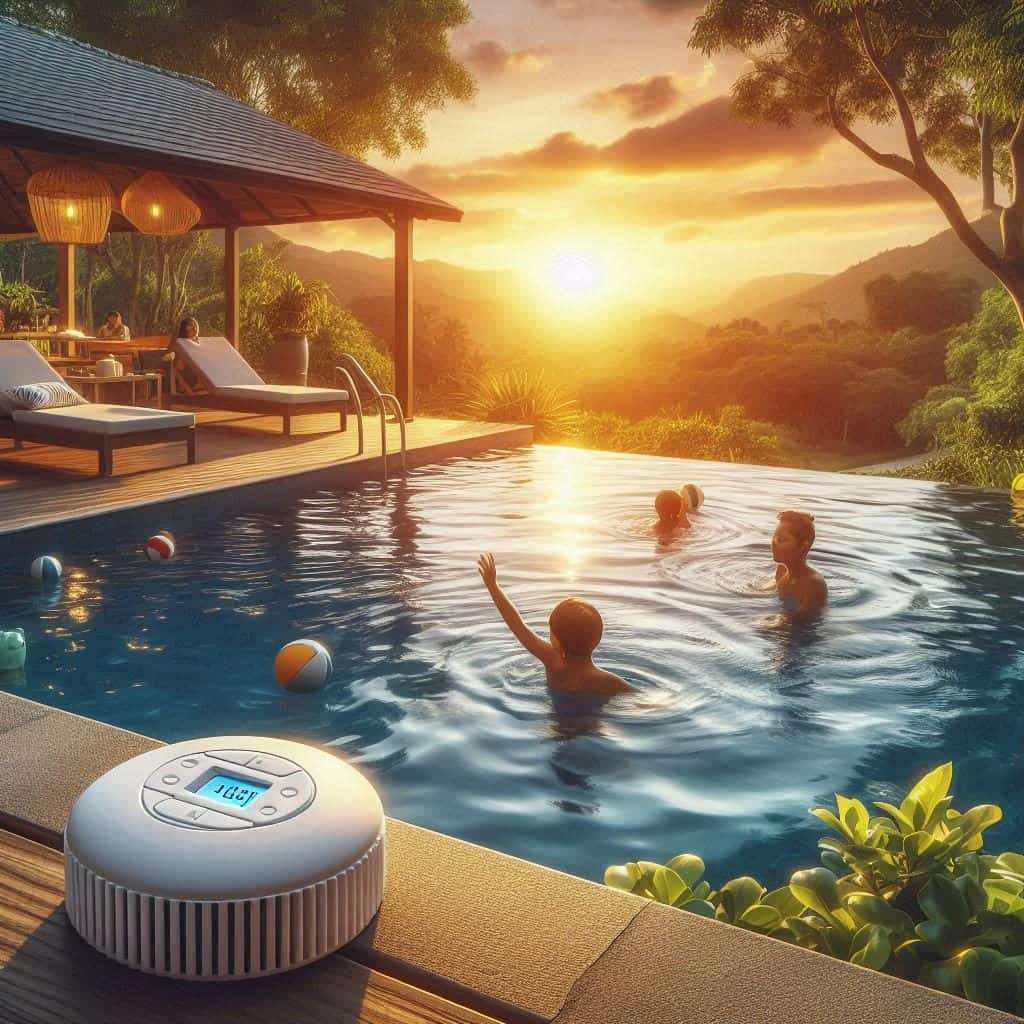Making a Splash: How Pool Alarms Can Provide Peace of Mind for Parents

As a parent, you always look for ways to enhance your family’s safety, especially around the pool. Pool alarms offer different types, such as entry-point alarms, surface action alarms, and underwater detectors. Each type provides a unique layer of protection by detecting unauthorized access or disturbances in the water. Investing in these devices keeps your children and pets safe and gives you peace of mind. It’s essential to consider your specific safety needs and local regulations when choosing the right pool alarm system. You’ll be better equipped to relax and enjoy your backyard oasis with the right setup. Understanding how these systems work and maximizing their effectiveness is crucial for ensuring your family’s safety near the pool.
Takeaways
- Pool alarms alert parents to unauthorized pool access, enhancing child safety.
- Various alarm types cater to different safety needs and pool sizes.
- Compliance with local safety regulations ensures legal and functional reliability.
- Regular maintenance and testing keep alarms effective and dependable.
- Alarms work alongside self-latching gates to secure the pool area comprehensively.
Understanding Pool Alarms
Pool alarms are essential for ensuring the safety of children and pets around pools. Understanding how these alarms work and the various types available is crucial in creating a child-proof pool environment. By incorporating pool alarms into your safety measures, you add a protective layer that will alert you when someone unexpectedly enters the pool area. These devices act as guardians, allowing your little ones and furry friends to enjoy the pool safely under proper supervision. It’s more than just installing a device; it’s about providing a watchful eye that enhances your pool area’s overall safety and enjoyment.
A self-latching gate is an important safety feature for your pool area. It automatically secures the gate after someone enters or exits, reducing the risk of children or pets getting in unsupervised. When combined with a pool alarm, this feature adds an extra layer of security to keep your pool area safe. By ensuring the gate latches securely, you can have peace of mind knowing that your pool is well-protected.
Sub-surface alarms are advanced devices that detect disturbances beneath the water’s surface. They offer a discreet and reliable way to monitor underwater activities, making them more effective than surface alarms. These alarms are designed to notify you of any unusual movements in the water, which can help prevent accidents. By investing in this technology, you not only improve safety but also strengthen your connection to your family’s well-being. It’s crucial to prioritize safety and consider innovative solutions like sub-surface alarms to protect your loved ones.
Types of Pool Alarms
Let’s examine different types of pool alarms that can help keep your family safe. Choosing the right one is important based on your specific safety needs and preferences. Being part of a community of vigilant parents can provide additional support and peace of mind. Remember, the safety of your loved ones is a top priority, so exploring these options is worth the effort. By understanding the different types of alarms available, you can decide to enhance pool safety at home.
Here’s a closer look at three main types:
- Entry-point Mounted Alarms: These alarms are installed at the gate or door to the pool area. They typically use infrared beams or magnetic connections to detect when someone enters the pool area without permission. This cost-effective option alerts you immediately when the physical boundary is breached.
- Surface Action Alarms: Positioned around the pool’s perimeter on the deck, these alarms detect waves and ripples on the water’s surface. They activate when there’s unexpected movement, such as a child or pet accidentally falling into the pool. This type is particularly useful for early detection before anyone is fully submerged.
- Underwater Motion Detectors: These sophisticated systems use sonar grids to monitor pressure changes and movements underwater. They’re highly effective at detecting submerged objects, making them an excellent choice for ensuring that unnoticed entries below the surface are caught quickly.
Each pool alarm type offers a unique layer of protection, ensuring that you’ve covered the bases from every angle.
Installation and Costs
When it comes to pool alarms, installation costs can vary widely. You might pay as little as $50 for a basic entry-point alarm or up to $700 for a more advanced underwater motion detector. Remember that higher costs typically mean more advanced technology and better detection capabilities, giving you greater peace of mind. By investing in a more sophisticated alarm, you can enhance the safety of your pool area. Choosing an alarm that suits your needs and budget is important while providing the level of protection you desire.
When installing pool alarms, it’s best to hire professional technicians. They have the expertise to meet the specific height requirements and ensure your alarms are installed correctly and properly. This is crucial for the safety of your family. Professional technicians not only follow guidelines but also make sure that your alarms provide the protection needed. By entrusting this task to experts, you can have peace of mind knowing that your loved ones are safe around the pool.
If you have a large pool area, having multiple alarms is important to ensure full coverage. While this may require a higher initial investment, each alarm serves as an additional layer of protection for your family’s safety. Think of these alarms as extra sets of eyes that enhance the security around your pool. You can better monitor and respond to any potential risks or dangers by installing multiple alarms. This proactive approach can help prevent accidents and ensure a safer environment for everyone using the pool.
Maximizing Alarm Effectiveness
To ensure your pool alarm works well, regularly test and adjust its sensitivity levels. This way, it can detect real dangers without getting triggered by small things like wind or animals. Finding this balance is crucial for your peace of mind, as it reduces false alarms. You’ll feel more confident that it’s a real issue to address when the alarm goes off.
Here are some additional steps you can take to enhance the reliability and performance of your pool alarm:
- Choose a User-Friendly System: Opt for an alarm that’s easy to operate. This guarantees you can manage settings and adjustments without hassle, fostering a secure and user-friendly environment for everyone in your household.
- Ensure Audible Alerts: Verify that the alarm volume is sufficiently loud to be heard anywhere on your property. You must be alerted instantly, no matter where you are, ensuring swift response to potential dangers.
- Keep Batteries Charged: Regularly check and maintain the alarm’s power supply. A fully charged system avoids downtimes and maintains continuous safety measures, ensuring your alarm is always ready to perform when needed.
Local Safety Regulations
To ensure your pool is safe and follows the rules, it’s crucial to know the local safety regulations. As a responsible pool owner, you play a key role in keeping everyone safe, especially the little ones who may not realize the dangers. By understanding and following these regulations, you’re helping create a secure community environment. Safety is a top priority, so being informed and compliant is essential. Don’t take any risks regarding the well-being of your family and neighbors.
In certain states, such as California, local safety regulations mandate that new pools have self-closing gates and pool alarms. These regulations are not just suggestions; they are requirements that ensure everyone’s safety. Verifying that your pool alarm and other safety features meet these legal requirements is crucial. By complying with these laws, you stay within the legal boundaries and create a safer environment where everyone can relax and enjoy themselves without worry. You actively contribute to a secure and worry-free pool environment by following these safety measures.
Frequently Asked Questions
What Is the Purpose of a Pool Alarm?
A pool alarm aims to alert you when someone enters the water. It’s an essential safety tool, especially since drowning is a top cause of accidental deaths among children. You’re not alone in this.
Do Pool Alarms Save Lives?
Yes, pool alarms do save lives by alerting you immediately when someone enters the pool area. They greatly reduce the risk of drowning, especially for children and pets. It’s a lifeline you shouldn’t overlook.
Do Pool Alarms Prevent Drowning?
Yes, pool alarms can prevent drowning by alerting you immediately if someone enters the water. They help guarantee that you’re always aware and can react quickly to keep your loved ones safe.
How Well Do Pool Alarms Work?
Like vigilant sentinels, pool alarms stand guard over your watery oasis. They’re quite effective, sounding alerts if anyone—be it a child or pet—ventures too close, offering you a precious layer of security and belonging.

